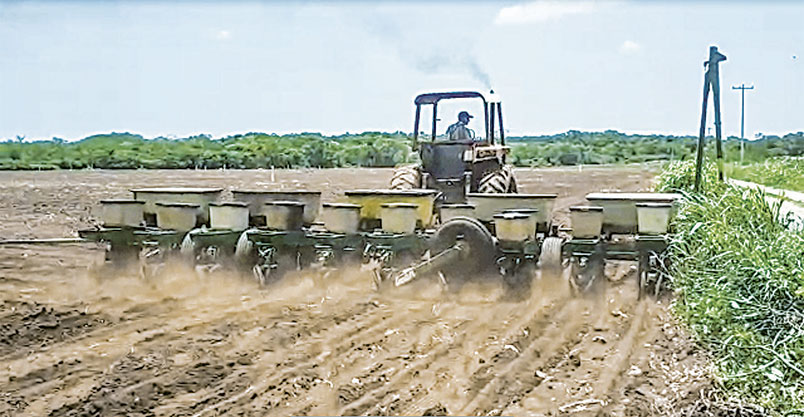
Photo Archive: La Jornada/Elsa Medina
by Ana de Ita*
Thanks to the series of excellent reports, “Echos of Agrarian Counter-reform12” that La Jornada offered us last week, it is possible to take a closer look at what has happened with the agrarian question after 30 years of counter-reform.
Data from the National Agrarian Registry confirm that very little of the area of social property has been sold, about 5.3 million hectares, of the 105 million that existed in 1992, while the number of ejidos3 and communities has increased by more than a thousand, as well as the number of agrarian subjects with land rights, which increased by more than 2 million. Thus, the core of Salinas’ counter-reform to divest land ownership and allow it to enter the market has failed. Mexico continues to be the country with more than half of its territory as social (communal)property.
In the states analyzed by La Jornada, which are characterized by important agricultural regions, there are different mechanisms for the control of ejido parcels.
In Sinaloa only 5 percent of the parceled land has become private property, but simulated settlement, as Valenzuela explains, has been the mechanism for buying land rights from the original ejidatarios. This transfer of rights affects 11 percent of the parceled land. Land renting is the widespread mechanism in the state to control large expanses of irrigated agricultural land, and through economies of scale achieve crop profitability, mainly of grains and oilseeds, which is impossible for small Sinaloan farmers who have about 10 hectares of irrigated land. Rent affects 70 percent of the ejido-owned land. Reports from Sinaloa express the difficulties of small commercial farmers in obtaining financing and marketing mechanisms that allow them to make their operations profitable, so they opt to rent their land to large agricultural entrepreneurs.
In Chihuahua, the full domain that turns ejidal plots into private property affected almost a quarter of the surface area (23 percent), while the transfer of rights is not so important, less than 2 percent. Researcher Quintana illustrates how Mennonite farmers drilled deep wells in desert lands dedicated to cattle ranching to transform them into intensive agricultural land — for walnut production, for example – even without a land use change permit. The over-exploitation of the aquifers causes the reduction of water for the ejidatarios who do not have the resources for this type of drilling. For the past decade, ejidatarios surrounded by Mennonite colonies have been denouncing water hoarding, which has even cost several lives.
The Mennonites are also at the center of what is happening in Campeche, where 8 percent of the ejido land has become private property, and where the transfer of land rights affects 5 percent of the area. The Mennonites have managed to acquire large tracts of land through the purchase of land rights to become ejidatarios. They establish chummy relationships with the Mayan peasants and extend control of their territory for intensive commercial agriculture of soybeans, in some cases transgenic, rice, corn or sorghum. They cut down the jungle and use toxic agro-chemicals that threaten Mayan beekeeping and affect the health of the population, but very few dare to denounce them.
In Jalisco and Michoacán, export agribusinesses have acquired land through long-term (20 or 30 year) rental contracts with ejidatarios, often on an individual basis and sometimes with ejidal assemblies. In Jalisco, only 7 percent of the ejido land has been transferred to full ownership, and the transfer of rights is not significant, but the change in the crop pattern towards agave, berries and avocado for export has been drastic and competes with food production. In Michoacán only 2 percent of the land area has been privatized, but export crops such as avocado plantations predate those of Jalisco, causing forest clearing, water hoarding and contamination to the detriment of rainfed agriculture. Ejidatarios and communal farmers are increasingly marginalized.
These echoes of the agrarian counter-reform show how, although the essential purpose of land privatization failed, the long-term project of substituting peasant agriculture for corporate and transnational agriculture has continued, and the ejidatarios and communal farmers, with very little support and with their own efforts confront the struggle for territory and natural resources against corporate agriculture, which has the support of very powerful political forces.
*Director of the Center of Studies for Change in the Mexican Countryside. (Ceccam)
This piece was published in La Jornada on November 7th, 2022. https://www.jornada.com.mx/2022/11/07/opinion/022a2pol
English translation by Schools for Chiapas
Footnotes
- https://jornada.com.mx/reportajes-especiales/ecos-de-la-contrareforma-agraria/
- https://jornada.com.mx/reportajes-especiales/ecos-de-la-contrareforma-agraria/ecos-dos.html
- Ejidos are tracts of land, whose usufruct ownership is communal, organized and administered by an assembly of ejidatarios, as enshrined in the Mexican constitution, following the Mexican Revolution.
